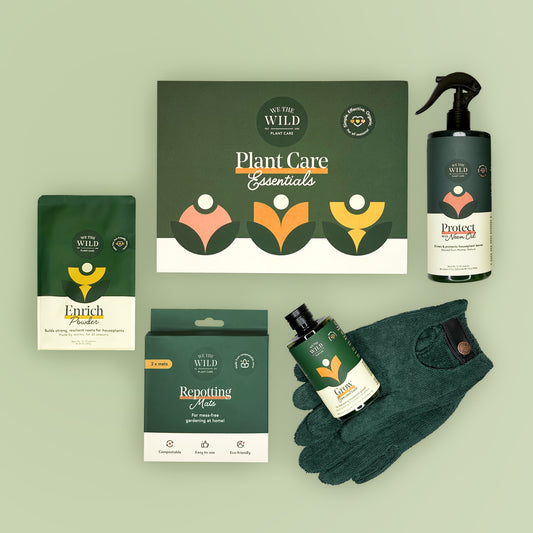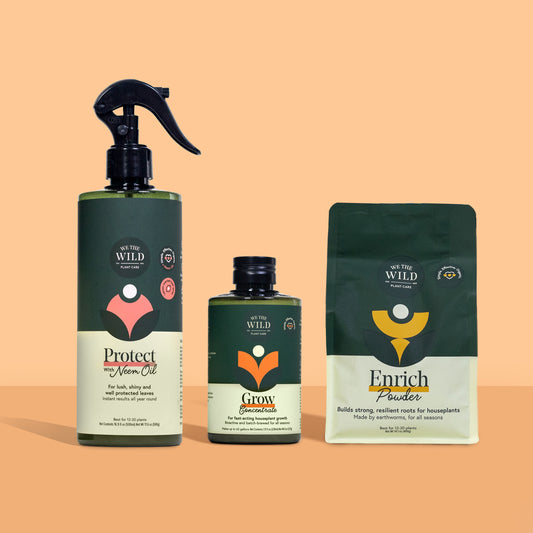If you're feeling that winter chill, your houseplants will be too! For tropical houseplants, being indoors during the winter season can be full of challenges. You can expect that shorter days, dry air, and temperature fluctuations can turn your leafy buddies into unhappy campers. But don’t worry! There's a few things to look out for when it comes to the most common houseplant problems in winter.
1. Lack of Natural Light or Sunlight
Did you know that if your houseplants aren't getting enough sunlight, they struggle to photosynthesize? When the sun rays are weak or non existent, like in winter, it can mean that your plants won't grow as quickly.
How to Fix Low Light In Winter:
- Move Houseplants Closer to Windows, but watch our for freezing panes! Take a look around your home. What's the brightest place? Put your plants there, ideally close to a window but not so close that the leaves may burn from frozen glass.
- Rotate Your Houseplants Often: Make sure that all of the leaves on your indoor plant gets enough light by regularly turning your plants. Doing it every week or so in winter will help every part of the houseplant get adequate light.
- Try Using Grow Lights: sometimes, natural light is scarce. That's why it's important to use Grow Lights! These replicate the natural rays that the sun gives.
2. Too Much Dry Indoor Air
Just like your skin, heaters can dry out houseplants and make them susceptible to pests and weaknesses.
How to fix houseplant issues from dry air:
- Group Your Indoor Plants Together: Have you ever seen mist rise above a rainforest? It's because leaves omit moisture. When your houseplants are grouped together, they will create a mini jungle and raise humidity around their leaves.
- Use an Indoor Plant Humidifier: grab a small humidififer and place it close to your plants. It will help by spraying tiny droplets of water and increasing moisture levels in the air.
3. Overwatering Houseplants in Winter
When the weather is cold like in winter, your houseplants need less water. One of the most common houseplant problems in winter is overwatering. Here's how to make sure that you don't overwater your houseplants in winter.
How to Fix Overwatered Houseplants in Winter:
- Check the Moisture In The Soil First: Stick your finger an inch into the soil—if it’s still moist, wait to water.
- Water Every 2 Weeks: most indoor houseplants can last 2-3 weeks without water during winter. Less is more!
- Stop using self-watering pots for your houseplants: root rot and other problems can come when you're using self watering pots in winter. It won't let the soil dry out properly.
4. Cold Drafts and Temperature Swings
Houseplants are used to tropical conditions which means that they are sensitive to fast changes in conditions and the temperature swings that can happen in winter. Cold drafts can shock your indoor plants.
How to Fix Houseplant Shock From Drafts:
- Keep Houseplants Away from Drafty Areas: Avoid placing your indoor plants super close to windows that aren't properly sealed, or drafty doors.
- Move Houseplants At Least 1-2 ft Away From Heaters: It will mean that the houseplant leaves won't be damaged by dry air.

5. Houseplant Pests Are Common In Winter
Stressed plants can bring on houseplant pests like fungus gnats and spider mites. Make sure that you're protecting your houseplants and looking our for the most common houseplant pests in winter.
How to Fix It:
- Inspect Indoor Plants Regularly: Check all the houseplant leaves on indoor plants like peace lillies, devils ivy and fiddle leaf fig plants. Make sure you look at the top and underside of your plants for signs of pests.
- Use Leaf Cleaning Gloves: regularly wipe your plants to remove early signs of pests and stop large invasions.
- Use Organic Pesticides: many people use products like Neem Oil to protect and fight against houseplant pests
6. Slow Growth In Houseplants
If you're not using Grow Concentrate or Enrich Powder, you will likely see plants slow down in winter. Some plants, like fiddle leaf figs and peace lilies, slow down in winter, which can look like they’re unhappy.
How to Grow Houseplants In Winter:
- Use bioactive fertilizer: Avoid fertilizing with synthetic fertilizer. Your houseplants need more than just nutrients in winter. They need cold busting hormones, growth promoting microbes and more.





